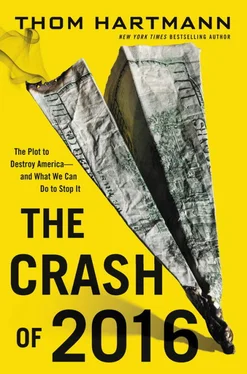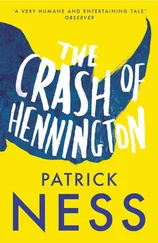When those Hoovervilles spread around the country in the early 1930s, and then became bastions for progressive organization and action, FDR had no choice but to be a revolutionary president, fundamentally change America, and wage war on the Royalists.
The Crash of 2016, like previous Great Crashes, will be a time of great opportunity to reclaim much of the ground lost to the Economic Royalists since the 1970s.
But it will also be time of great danger, as history has proven. In the period after the last Great Crash Germany had Hitler and we had FDR, and our nations took very different directions in response to the crash. An awakened citizenry and honorable leadership will determine whether we succeed or fail.
We do know that no matter how bad things get during the Crash of 2016, organized people will always find one another and begin building the movements necessary to take on the Economic Royalists. It happened in the 1930s, and it will happen again following the Crash of 2016. We must rely on them.
First things first: We need to tip the scales of power away from organized money and back to organized people. And the way to do that is to get rid of this whole idea of corporate personhood.
The Supreme Court gave us corporate personhood, and there are only three ways to undo a bad Supreme Court decision. All three have been used at various times.
The first is to wait until the composition of the court changes, which can only happen when one or more of the bad judges retires or dies and is replaced by others more competent. Then the court takes on a case that involves the same issues and, as with the Brown v. Board of Education or Roe v. Wade decisions, pushes the court in a new direction.
The second is for the American people, the president, and Congress to understand the consequences of Citizens United , and break with the court.
Arguably this happened with the Dred Scott decision in 1857, which ruled that black persons were actually property , and thus led us directly into the Civil War. That Supreme Court decision led to Abraham Lincoln’s Emancipation Proclamation and the passage of legislation clarifying the rights of African Americans, although it ultimately took a war and the passage of the Thirteenth, Fourteenth, and Fifteenth Amendments to purge slavery from our laws and from our Constitution.
Ironically, the Citizens United case is the mirror opposite of Dred Scott in that it ruled that property —a corporation—is now a person . And, rhetoric from some on the fringes of both the Tea Party and the Occupy Wall Street movements notwithstanding, few Americans have any desire to see a second Civil War or American Revolution.
The third way to undo—or supersede—a Supreme Court decision is to amend the Constitution itself so the Court can no longer play word games with ambiguous or broadly worded language. We did this, for example, to both institute and then to repeal the prohibition, manufacture, and sale of alcohol.
The constitutional-amendment route seems the most practical and long lasting, even though it may be the most challenging. But post-crash, the urgency will be there to make it happen.
Over 29,000 amendments to our Constitution have been put forth in Congress since the founding of our republic, and only 27 have passed the hurdle of approval by two-thirds of the members of Congress and three-fourths of the states. Nonetheless, successful amendments are driven by a widespread sense that the change is absolutely essential for the good of the nation.
An example of this is the Twenty-Sixth Amendment to drop the voting age from twenty-one to eighteen. It was largely brought about by the rage and impotence young people felt in America during the Vietnam War era (as expressed in the protest song “Eve of Destruction”: “You’re old enough to kill, but not for votin’…”). The need for young people to participate in a political process that could lead them to war was so clear that the Twenty-Sixth Amendment passed the Senate in March 1971 and was completely ratified by the states on July 1, 1971.
On December 6, 2011, Los Angeles became the first major city in the United States to call for a constitutional amendment to end corporate personhood. The Los Angeles City Council voted unanimously to say that money is not the same as free speech, thus asserting a basis to overturn the Citizens United decision.
There have been similar resolutions passed in Boulder, Colorado, and Missoula, Montana, that say corporations are not people and money is not speech.
A group of Democratic senators introduced a new constitutional amendment to overturn the Supreme Court’s Citizens United decision. The senators who signed on to this amendment include Tom Udall, Michael Bennet, Tom Harkin, Dick Durbin, Chuck Schumer, Sheldon Whitehouse, and Jeff Merkley.
Representative Ted Deutch, a Democrat on the House Judiciary Committee, introduced another constitutional amendment in November 2011, the “Outlawing Corporate Cash Undermining the Public Interest in Our Elections” Amendment. Robert Weissman, president of Public Citizen, applauded Representative Deutch’s amendment, saying, “It would clarify that constitutional rights are intended for real, live, breathing human beings. It would end corporate spending on elections. And it would give Congress authority to adopt a sensible campaign finance system. It would make America stronger, more democratic and more just.”
Senator Bernie Sanders proposed, in December 2011, the “Saving American Democracy” Amendment, which would overturn Citizens United and make it clear that corporations are not people. In a statement Senator Sanders said, “There comes a time when an issue is so important that the only way to address it is by a constitutional amendment.” Sanders said in the effort to override the court decision that he labeled it “a complete undermining of democracy.” Senator Sanders’s “Saving American Democracy” Amendment has an interesting component that makes it different from all of the other proposed amendments and remedies: Section 4 of the amendment challenges the basis for every other Supreme Court decision related to campaign finance. He takes aim at the 1976 Buckley v. Valeo decision, in which the Supreme Court ruled that spending money to influence elections was a form of protected free speech, and struck down limits on expenditures.
There are groups all over America bringing forth resolutions in cities large and small to say the same. These are the training grounds for a constitutional amendment.
Several proposals are on the table, but I particularly recommend the model put forth by David Cobb at MoveToAmend.org. This proposed amendment is more explicit than simply inserting the word “natural” before the word “person” in the Fourteenth Amendment and could seriously begin the process of turning the United States into a democratic republic that is once again responsive and responsible to its citizens instead of to its most powerful corporations. The proposed amendment states the following:
Section 1
[ A corporation is not a person and can be regulated ]
The rights protected by the Constitution of the United States are the rights of natural persons only.
Artificial entities, such as corporations, limited liability companies, and other entities, established by the laws of any State, the United States, or any foreign state shall have no rights under this Constitution and are subject to regulation by the People, through Federal, State, or local law.
The privileges of artificial entities shall be determined by the People, through Federal, State, or local law, and shall not be construed to be inherent or inalienable.
Читать дальше












